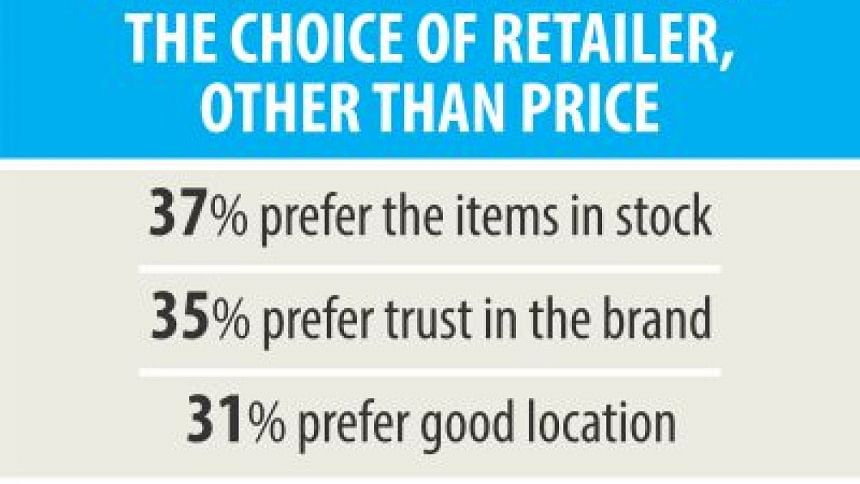Building trust among retail consumers

Cyberspace has changed the way consumers have been interacting with brands over the last couple of years. The power of influence has clearly shifted onto consumers. This has prompted brands to increase engagement with their consumers to understand more about their needs and, in turn, become more responsive. However, consumers want brands to do more; they want them to become more authentic, to own up to their mistakes and even to take a stand on social and political issues. Thus, today, winning consumers' trust has become more aligned to the business success of a brand.
Over the last couple of years, Bangladesh's organised retail industry has been growing at an impressive rate due to the economy's macroeconomic growth. Quite a few retail companies have crossed the milestone of 100 retail outlets in the country. More importantly, some specialised retailers are also expanding internationally. Most of their expansions are happening through local franchisees in those countries. The retailers are allowing their brand names to be used, they are sharing their product catalogues and, in certain cases, are also sharing technical know-how. The onus to build trust with a diverse community of international consumers lies with these retailers, not just for the brands they have built but also for the underlying brand promise of their own country.
According to PwC's Global Consumer Insights Survey 2018, a significant number of consumers (35 percent) have stated that their choice of retailers is determined by the trust they have in a brand. Trust, in fact, was one of top three reasons based on which consumers choose a retailer. However, building trust is not an easy job. In fact, it takes time to understand individual consumers and to consistently meet their requirements. By consistently meeting their requirements, trust is developed.
Increasingly, retailers are relying on technology to meet their consumers' requirements. Beyond selling a product, retailers are trying to engage more with their consumers through various means, including social media. This also provides them with opportunities to collect enough data to gain insights about their consumers. However, consumers are more aware today about the potential use of the data they contribute. Most consumers would prefer to contribute data in return for better experience. However, they would not like to see their data being misused. If consumers' data happens to be abused, their trust in retailers will be eroded faster. While retailers in Bangladesh are deploying technology for their business benefits, they also need to introduce transparency in some of their business processes to build and sustain the trust of their consumers.
Trust also brings a lot of benefits to retailers. Trust creates new opportunities for retailers to start selling a new product line, or to sell private labels. For example, consumers are more receptive to healthcare products from a non-pharmaceutical store, if they trust the retailer. Experimenting with this idea using non-prescription drugs has shown promising results in some countries. This is going to alter the traditional competition landscape if retailers invest in building trusted brands.
Technology will increasingly create a level playing field in such situations. For instance, consumers today don't expect to receive healthcare from a physician inside a non-pharmaceutical store. However, they are getting comfortable with services that are machine-delivered such as the measurement of blood pressure. With the development of powerful algorithms and cloud computing, a good number of activities pertaining to medical diagnosis and prescription will become machine-delivered services. Non-pharmaceutical retailers will be able to deliver such services to consumers if they build the right degree of trust with their consumers. The business of health services will increasingly become health retailing, and retailers with trusted brands will have a competitive advantage.
Shopping, as an activity, used to mean a visit to one or multiple physical retail stores for buying certain products and then carrying them home. Only limited types of products like products with big sizes or heavy weight, such as an iron safe, or products requiring labour-intensive installation, such as an air conditioning machine, were delivered to customers' homes by retailers. Today, shopping often means ordering goods online and expecting them to be delivered on time. Shoppers are increasingly placing orders through websites or mobile apps of e-commerce retailers.

Business-to-consumer e-commerce is contributing 12 percent of the total retail business worldwide, according to the leading consumer data portal Statista. However, issues relating to delivery logistics still remain unsolved. While consumers are increasingly expecting faster delivery and certainty in delivery time, their expectations are not being met. Quite often, such consumers vent anger and frustration about the delivery failures on social media. Such experiences get shared multiple times among their connections and beyond. Suboptimal delivery logistics is one area that erodes trust and negates benefits from consumer engagement activities.
For a consumer, shopping does not end with merely receiving a product. A consumer may want to return it back too. Therefore, retailers should have a well-designed solution to allow consumers to return goods and receive refunds. This will, in turn, help in winning consumers' trust back.
The good news is that there are quite a few technology-led solutions to solve the problem of goods delivery. The solutions are available both for retailers as well as transportation providers. Modern technologies can foster more productive collaboration between retailers and transporters to implement winning solutions and create better consumer experience.
Building trust among consumers is going to be an integral part of the business of retailers in Bangladesh. It's important to create a strategy for this and adopt the right technology to develop trusted brands, gauge the trust of brands continuously and enhance brand value.
The writer is a partner at PwC. The views expressed here are personal.

 For all latest news, follow The Daily Star's Google News channel.
For all latest news, follow The Daily Star's Google News channel. 



Comments